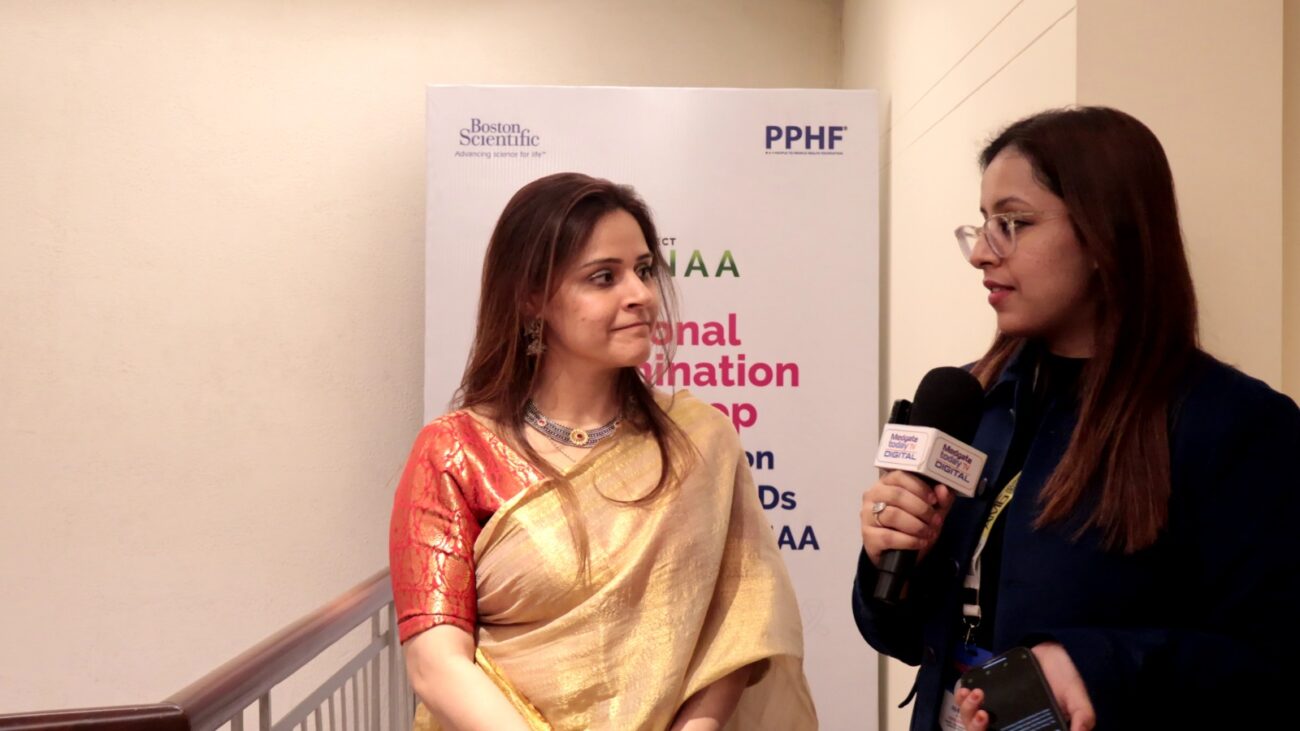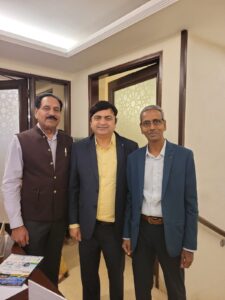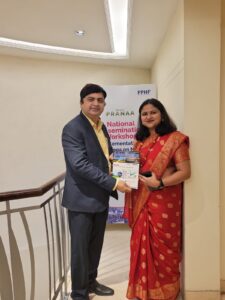People to People Health Foundation’s (PPHF) releases Roadmap for ‘NCDs: Aligning with Viksit Bharat @ 2047’
It seeks to ensure health, dignity & prosperity for all and envisions a community centric, sustainable approach to preventing Non-communicable diseases (NCDs) as between 2001 and 2019, they caused 37.6 million premature deaths in India People

It seeks to ensure health, dignity & prosperity for all and envisions a community centric, sustainable approach to preventing Non-communicable diseases (NCDs) as between 2001 and 2019, they caused 37.6 million premature deaths in India
People to People Health Foundation’s (PPHF) released Coffee Table Book on Project PRANAA Learnings and Experiences. This booklet combines critical insights from the PRANAA program with a roadmap for ‘NCDs: Aligning with Viksit Bharat@2047’. The successful execution of this would require collaboration, innovation, and commitment from all stakeholders.
NCDs pose a significant global health challenge, accounting for approximately 71% of all deaths worldwide, creating a staggering economic burden of trillions due to lost productivity and healthcare costs.
This roadmap envisions a community-centric, collaborative, and sustainable approach to NCD prevention, aligning with India’s aspirations for 2047, ensuring health, dignity, and prosperity for all Indian citizens. It was released during a ‘National Dissemination Workshop on Program Implementation Learnings on NCDs’ held in Delhi today (6th Dec 2024) by PPHF.
Distinguished dignitaries, included Shri Dharampal, IAS, Ex-Advisor to the Chandigarh Administration, Govt. of India, Dr Varinder Garg, MD, OSD to President PGIMER, Chandigarh State Government Health Department representatives, (Haryana and Maharashtra), Dr. Abhishek Kunwar, National Professional Officer (NCD), WHO, and Dr. Vibhav Garg, Director- Health Economics & Govt Affairs, India HUB & ASEAN, Boston Scientific.
While delivering the keynote address, Shri Dharampal, IAS, Ex. Advisor Chandigarh Administration, Government of India, said, “The rise in non-communicable diseases (NCDs) is one of the gravest public health challenges of our time, with over 60% of deaths in India and more than 70% globally attributed to these conditions. Cardiovascular diseases, cancer, diabetes, and chronic respiratory illnesses are the major culprits. Alarmingly, the proportion of deaths caused by NCDs in India has surged from 37.9% in 1990 to 61.8% in 2016.”
Further he said, “To address this, the Govt. of India has launched several critical programs, including the National Program for Prevention of Cancer, Diabetes, Cardiovascular Diseases, and Stroke, and initiatives like the National Health Mission’s population-based screening. These efforts underscore the importance of prevention, early detection, and lifestyle modifications. It is essential to promote healthier habits, like encouraging home-cooked meals, reducing screen time for children, and mandating physical activity in schools. With strategies like these, and collaborations like the one between PPHF and Boston Scientific, we can mitigate the NCD crisis.”
Dr Varinder Garg, MD, OSD to President PGIMER, Chandigarh, State Government Health Department representatives, (Haryana and Maharashtra) said, “There is an alarming rise in NCDs among rural and remote populations in India, and the lack of awareness among rural people only exacerbates the burden. Under the visionary leadership of our Prime Minister, we have a well-established network of Arogya Mandirs that can address the NCDs burden by awareness, prevention, early detection and quality care. I congratulate PPHF for their project PRANAA initiative in addressing this major burden through capacity building.”
The Key Aspects of this Roadmap include
- Strengthening Prevention and Early Detection
- Strengthen policies on tobacco control, sugary drink taxes, and front-of-pack labelling.
- Scale behaviour change campaigns on healthy lifestyles and mental health.
- Equip Health and Wellness Centres for screening and diagnosis of NCD
- Establishing a National NCD Task force for developing innovative financing sources, Public-Private partnerships models, Health bonds etc
Elaborating on the importance of tackling NCDs, Dr Laxmikant Palo, CEO, People to People Health Foundation (PPHF), “PPHF remains committed to work together with health system and private sectors on mobilizing communities through regular awareness, training and screening programs in tackling the rising burden of Non-Communicable Diseases. We apply a collaborative, integrated, transdisciplinary approach that bridges the existing operational gaps in NCD programming.”
PROJECT PRANAA
This PRANAA initiative aims to meet the primary healthcare needs of the underprivileged population for NCDs in the Primary Healthcare (PHC) and Urban PHC areas.
Boston Scientific supports PPHF’s broader mission, including initiatives like Project PRANAA, which is implemented in in Gurugram, Haryana and Pune of Maharashtra. It contributes to the National Program for Non-Communicable Diseases (NP-NCD) and aligns with the Government of India’s ‘75/25 initiative’ on NCDs. It aims to strengthen healthcare delivery, promote digital health avenues, and improve public health outcomes.
This workshop showcased learnings and impacts from Project PRANAA through presentations, community voices, and deliberations by esteemed dignitaries from the health sector, Government and international organizations.
On the occasion, Madan R. Krishnan, VP and MD, APAC Growth Markets, Boston Scientific, stated, “At Boston Scientific, we are dedicated to transforming lives through innovative medical solutions and meaningful collaborations. Our support for PPHF’s initiatives – such as Project PRANAA – reflects our mission to improve the health of patients around the world and aligns with India’s vision of accessible healthcare by 2047.”
PRANAA OVERVIEW
The Key Objectives of PRANAA were to increase public awareness about NCDs through community health education and promotion, strengthen the implementation of NPNCD population-based screening guidelines at the PHC and Urban PHCs and to enhance the capacity of the PHC and UPHC health team to effectively provide essential NCD services. It targeted community members above the age of 30 years and Healthcare professionals from Health centres.
The Implementation Geography included Urban Primary Healthcare Centre Mullahera in Gurugram, Haryana and Primary Healthcare Centre Maan in Pune, Maharashtra
In Pune, non-communicable diseases (NCDs) caused 66% of deaths in 2019, with cardiovascular diseases (CVDs) accounting for 30%. Hypertension affects over 28% of the population. Despite robust healthcare infrastructure, barriers like access and affordability persist. Promoting healthy lifestyles, preventive care, and elderly-focused health initiatives are key to improving community well-being.
Gurugram faces a high burden of NCDs, with hypertension (25-30%), diabetes (10-15%), COPD (5-10%), and cancer (5-10%). Urbanization fuels these lifestyle-related conditions, while healthcare disparities and resource strain persist. Enhanced capacity, accessibility, health awareness, and youth engagement are essential to prevent NCDs and improve community health.
Project PRANAA was honoured with the Silver Award in the CSR NCD Control Project category at the prestigious 8th CSR Health Awards! This recognition highlights the project’s innovative approach to leveraging the existing NPNCD program platform and government healthcare infrastructure. By fostering collaboration among key stakeholders, Project PRANAA addresses critical gaps, enhances community awareness, and promotes population-based screening.
Key Achievements
- 14,071 Individuals Reached for NCD Awareness
- 8,738 Adults Screened for NCDs
- 135 Screening Camps, 44 Community Awareness Drives organised
- 693 Women reached via 06 Special Women Wellness Camp
- 107 Healthcare Workers Trained
The learnings from PRANAA highlighted the need to create a sustainable community centric model to tackle NCD challenges. As India strives towards becoming a Viksit Bharat (Developed India) by 2047, the vision cannot be realized without addressing the growing burden of Non-Communicable Diseases. India’s future depends on a holistic, multi-sectoral involvement from policymakers, healthcare providers, private sectors, and civil society for creating a human-centric approach to NCD prevention and control.








